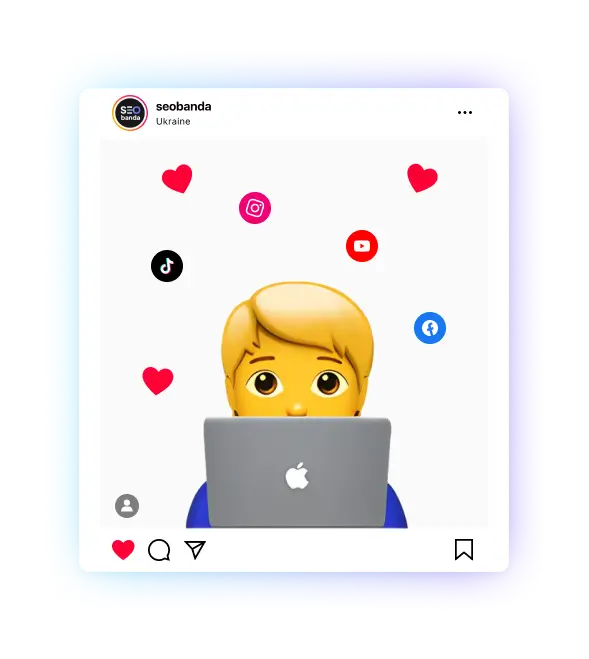



The main tasks of SMM
The goal of social media marketing is to create and maintain a positive brand image, attract new customers, and earn the loyalty of existing ones, so let’s take a closer look at what SMM tasks are performed:
- Content creation: posts, videos, images should be interesting and useful to attract users’ attention and make them interested in your product or brand.
- Interacting with the audience: responding to comments, participating in discussions, and communicating with subscribers to maintain an active dialog and improve customer relations.
- Advertising: posting paid posts to increase the volume of users who may be interested in your product or brand and increase your target audience.
- Performance analysis: tracking and analyzing metrics such as the number of likes, comments, reposts, and conversions to your website or profile. This is done to understand the effectiveness of the strategy and make adjustments to achieve better results.
So, the main goal of social media marketing is to reach a new audience and interact with existing users. It sounds simple enough, but let’s take a look at the entire list of responsibilities of an SMM manager.


What does an SMM specialist do?

An SMM manager is a person who promotes a company or product on social media. The main responsibilities of an SMM specialist:
- Strategy development:
- Market and target audience analysis: a social media advertising specialist must understand who his target audience is, what their preferences, hobbies, and pains are (too much work, a small child does not let them sleep, etc.). An SMM specialist should create a complete profile of their client and learn everything about them, from their age to the time they log in to social networks.
- Identification of goals and objectives: the SMM specialist (as SMM specialists are called in slang) needs to set specific goals that can be calculated, relevant, achievable and have a clear time frame. This strategy of goal setting is called SMART.
- Content creation:
- Planning and development of a content plan: creating a clear publication schedule, topics for future posts, formats (texts, images or videos), frequency of publication, and much more should be included in such content plans, as content should be informative, useful and consistent.
- Content creation: An SMM manager has to create texts, pictures, videos, and publications. This is a rather complicated process, because in order to create relevant and useful content, the SMM manager must not only understand social media marketing, but also the product being promoted.
- Social media management:
- Content publishing: posting created images, videos, and texts on social media (Facebook, Instagram, Twitter, LinkedIn, etc.) based on current trends, hashtags, and audience.
- Activity monitoring: The SMM specialist analyzes the audience’s reaction (likes, comments, reposts, etc.) and understands how interesting, useful, and effective the content is. Depending on the reaction of users, adjustments and improvements are made to the promotion strategy.
- Interaction with the audience:
- Responding to comments and messages: in addition to understanding SMM and knowing the specifics of the product and company, a SMM specialist must also be able to communicate with people, help them, advise them, and make them interested in the product.
- Participation in discussions and interaction with subscribers: constant maintenance of an active dialog with the audience.
- Advertising in social networks:
- Setting up and launching advertising campaigns: using tools such as Facebook Ads and Google Ads. In addition, you need to customize your ads to the right target audience to reach those who might be interested in your product.
- Advertising optimization: it is unlikely to launch a 100% successful advertising campaign on the first try, so the work of an SMS specialist includes analyzing the results and adjusting the strategy to increase efficiency and get new results.
- Analysis and reporting:
- Tracking key metrics: analysis of indicators such as audience reach, engagement, number of subscribers, conversion.
- Preparation of reports: The SMM specialist constantly provides reports on the results obtained through social media and his suggestions for improving the strategy.
- Development and improvement of competence:
- Tracking trends: this is a key point, because many beginners who want to become an SMM manager believe that their responsibilities are to watch TikTok and Instagram all day, pay attention to trends and shoot the same videos, but this is not entirely true. A SMM specialist does have to understand and follow current trends, but he or she also has many other responsibilities, which we have discussed above.
- Attending webinars and courses: a true SMM specialist always improves his or her skills through third-party training programs. As mentioned above, SMM specialists not only develop themselves in the field of SMM, but also attend specialized webinars on the niche they are working on.
Thus, it is not difficult to understand that an SMM specialist is a very versatile person who knows not only about SMM promotion. To be a truly highly skilled SMM specialist, you need to have a large number of soft skills (be open to communication, be interested in everything around you, have an analytical mind, a design vision, a constant desire for development, etc.), as well as a lot of hard skills (the ability to set up Google Ads and Facebook Ads campaigns, analyze the target audience and competitors, create content plans, use photo and video editors, etc.)


Why and who needs SMM promotion?
A lot of companies and organizations need social media promotion to achieve various goals. Here are some reasons why SMM is needed:
- Increase brand awareness: social media allows you to quickly spread brand information to a wide audience and reach target customers for further communication. This is useful for startups, new companies, and large, well-known brands that want to stay in the spotlight.
- Attracting new customers: targeted advertising can help you reach new potential customers. This is relevant for companies seeking to expand their customer base, particularly small and medium-sized businesses.
- Improved customer support: social media allows you to quickly respond to customer requests and solve their problems in real time. This is useful for any company that values its users and wants to help them solve their problems.
- Receiving feedback: social media is the best source of getting feedback from users, which allows you to improve products, services, and customer service. This is necessary for companies that want to meet market needs, stay competitive, and constantly improve their products.
- Advertising campaigns: social media provides an opportunity to effectively promote products and services through paid targeted advertising. This is relevant for any business that wants to increase sales and attract new customers.
- Gaining expertise: publishing useful and interesting content helps companies to become an expert in their niche and gain the trust of customers. This is suitable for consulting companies or any other organizations that want to gain credibility in their field.
Social media marketing provides a lot of opportunities for development, as more than 61% of the world’s population uses social media in 2024, and this number is growing rapidly, as a year ago this figure was 57%.

Increase visibility
for your business: SEO solution for growth!


What tools are used in SMM?

Social media marketing uses various tools to achieve marketing goals. Here are the main ones:
- Social media platforms:
- Facebook: used to create branded pages, groups, posts, and run ads.
- Instagram: a platform for visual content, photos, stories, IGTV.
- LinkedIn: used for professional networking, articles, and B2B advertising.
- YouTube: a platform for publishing video content, reviews, blogs, webinars.
- Content planning and management tools:
- Hootsuite: helps manage multiple social media accounts, schedule posts, and analyze performance.
- Buffer: similar to the previous tool, but has slightly less functionality.
- Later: specializes in scheduling posts for Instagram with the ability to visually preview the page.
- Analytical tools:
- Google Analytics: tracks traffic from social networks to the website.
- Facebook Insights: provides data on the effectiveness of Facebook advertising campaigns.
- Tools for content creation:
- Canva: an easy-to-use graphic editor for creating visual content.
- Adobe Spark: a tool for creating video and graphic content.
- Lumen5: creates video based on text
These are some of the tools that are commonly used by texters. They can come in handy if you decide to become an SMM specialist or implement social media promotion on your own.

Increase visibility
for your business: SEO solution for growth!


Conclusion
To be a professional SMM specialist, you need to have various skills and know not only social media promotion but also the product. But despite the complexity of the SMM specialist’s work, his or her work is very important for any business and can multiply the company’s awareness and conversion.
You may also like it

Breadcrumbs to improve SEO and user experience
Breadcrumbs are a navigation element on a web page that helps users understand their location on the site and makes it easier to return to previous sections. They...

HTTP status codes: What do they mean and why are they important for SEO?
HTTP status codes are short three-digit responses that a website server provides to a client's browser in response to a request. Each http response code has its own...

Logo for the website: How to create a cool logo?
A logo is the visual face of your brand. It creates the first impression of your business and influences its recognition. Try to think of the logos of Nova Poshta...













